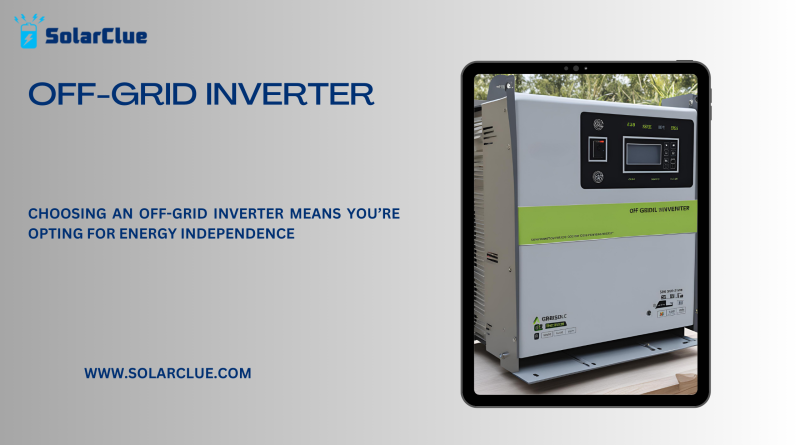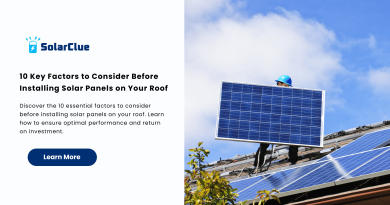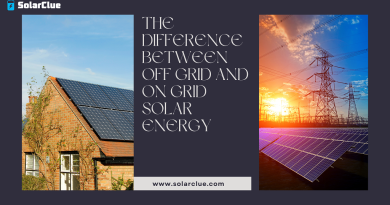Off-Grid Inverter
Living off the grid sounds like a dream for many people, and today, with solar power technology, it is becoming a reality. But to make this lifestyle work, especially with solar energy, an essential piece of equipment comes into play — the off-grid inverter. Whether you’re new to the concept or have some knowledge, this guide will take you through everything you need to know about off-grid inverters in a simple, everyday language.
Table of Contents
What is an Off-Grid Inverter?
At its core, an off-grid inverter is a device that converts direct current (DC) from your solar panels into alternating current (AC), which powers your home appliances. But what makes it “off-grid” is that it functions independently of the utility grid. This means that your solar-powered home does not rely on electricity from the power company. Instead, all your energy comes from renewable sources, like solar panels, and is stored in batteries for later use.
In simpler terms, think of it like a translator between your solar panels and your home. Solar panels produce DC power, but most home appliances use AC power. The inverter converts that energy into a usable form for your lights, fans, and gadgets.
Why Choose an Off-Grid Inverter?
Choosing an off-grid inverter means you’re opting for energy independence. Here are a few reasons why someone might choose this option:
- Remote Areas: In places where the utility grid is unavailable or unreliable, like rural or remote locations, an off-grid inverter offers a self-sufficient power solution.
- Eco-Friendly Living: If you are environmentally conscious and want to rely on renewable energy, an off-grid system allows you to reduce your carbon footprint.
- Energy Independence: You won’t have to worry about power outages, rising electricity bills, or dependency on grid-based electricity.
How Off-Grid Inverters Work
An off-grid inverter is typically a part of a more extensive system that includes solar panels and batteries. Here’s a step-by-step breakdown of how it works:
- Energy Generation: Solar panels capture sunlight and convert it into DC electricity.
- Energy Storage: This DC electricity is stored in batteries for later use.
- Conversion: When you need to power your home appliances, the off-grid inverter takes DC power from the batteries and converts it into AC power.
- Energy Use: The converted AC power is then used to run your home appliances.
In a typical day, solar panels will charge the batteries during sunlight hours, and the inverter will draw from the batteries to supply power during the evening or cloudy days.
Types of Off-Grid Inverters
There are different types of off-grid inverters designed for specific needs. These include:
- Pure Sine Wave Inverters: These produce a smooth, consistent power output similar to what you get from the utility grid, making them ideal for sensitive electronics like computers and medical equipment.
- Modified Sine Wave Inverters: These are more affordable but not as efficient or reliable for sensitive devices. They’re best for simpler appliances like fans and lights.
- Hybrid Inverters: These are a combination of off-grid and grid-tied systems. They can switch between grid power and solar power, providing more flexibility for people who still want a connection to the grid but also want to use solar energy.
Off-Grid Inverter vs. Grid-Tied Inverter: What’s the Difference?
An off-grid inverter is different from a grid-tied inverter in a few key ways. A grid-tied inverter works with a utility connection, and in many cases, excess power generated by solar panels can be sent back to the grid. With an off-grid inverter, you are entirely independent of the utility grid. This means you need to store any excess energy in batteries to use when your solar panels aren’t generating power.
Here’s a simple comparison:
| Feature | Off-Grid Inverter | Grid-Tied Inverter |
|---|---|---|
| Power Source | Completely from solar panels and batteries | Utility grid + solar power |
| Battery Storage | Required | Not required |
| Energy Independence | 100% independent | Depends on the utility grid |
| Cost | Higher due to battery storage | Lower upfront costs |
| Ideal For | Remote locations, energy independence | Urban areas, supplemental energy |
Benefits of Off-Grid Inverters
- Energy Independence: Once installed, you are no longer reliant on the utility grid, which gives you complete control over your energy production and usage.
- Cost-Effective in the Long Run: Although the initial costs are higher due to the need for batteries, off-grid systems save you money over time by eliminating monthly utility bills.
- Environmentally Friendly: By relying on solar energy, you reduce your carbon footprint and help contribute to a greener planet.
- Reliable Power Supply: In areas prone to blackouts or where grid power is unavailable, off-grid systems ensure you have continuous access to electricity.
Challenges of Using Off-Grid Inverters
While off-grid inverters offer several advantages, they also come with their own set of challenges:
- Initial Cost: The upfront investment for an off-grid system, especially with the addition of batteries, can be significant.
- Energy Storage: Since you aren’t connected to the grid, you must have sufficient battery capacity to store energy for times when solar production is low.
- Maintenance: Batteries need regular maintenance and replacement over time. Ensuring your system remains functional requires some level of upkeep.
Things to Consider Before Installing an Off-Grid Inverter
Before you decide to go off-grid, here are a few things to think about:
- Energy Needs: How much electricity do you use daily? This will help you determine the size of the system and battery capacity required.
- Location: Your location determines how much sunlight your solar panels will receive. Areas with more consistent sunlight are better suited for off-grid systems.
- Cost: While off-grid systems can save money in the long term, the initial setup cost can be high. You’ll need to budget for solar panels, batteries, inverters, and installation.
- System Maintenance: Off-grid systems require more maintenance than grid-tied systems, especially when it comes to battery upkeep.
Is an Off-Grid Inverter Right for You?
Going off the grid isn’t for everyone. It’s an excellent option for people living in remote areas, those wanting energy independence, or those who are particularly eco-conscious. However, it comes with higher initial costs and requires regular maintenance, especially for the battery components.
If you’re looking for a more environmentally friendly, self-sustaining power solution, then an off-grid inverter might be exactly what you need. Just make sure you’re prepared for the responsibilities and potential challenges that come with this type of system.
conclusion
An off-grid inverter offers a sustainable and reliable energy solution for those looking to become independent of the traditional power grid. While it requires careful planning and investment, the long-term benefits—both financial and environmental—can be well worth the effort. Visit SolarClue® to see the Best Solar inverters. SolarClue® actively sells solar energy products at discounts of up to 50% on its online marketplace.




